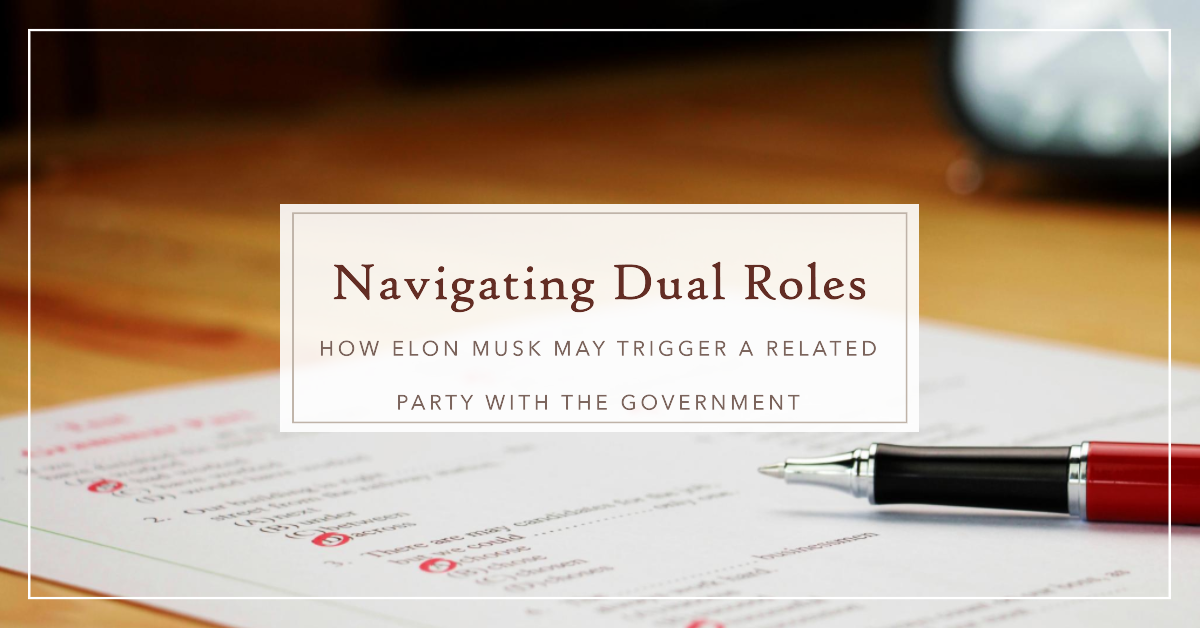The Perks and Pitfalls of Being Your Own Regulator – Musk’s government influence
Imagine filling out your company’s annual report and pausing at the section marked “Related Parties.” You scratch your head, sip your coffee, and then—lightbulb moment—you type: “The United States Government.”
That is the bizarre reality Tesla may soon face. With Elon Musk not only running Tesla but also serving in the Trump Administration’s Department of Government Efficiency (DOGE) (yes, that is the actual acronym), accounting rules might require Tesla to disclose its dealings with the U.S. government as if they were transactions between family members.
This is the kind of accounting headache that makes CFOs wake up in a cold sweat.
The $400M Cybertruck That Wasn’t
The debate was sparked when reports surfaced that the State Department planned to purchase $400 million worth of armored Tesla Cybertrucks—a deal that Musk himself claims he knew nothing about. The government later walked back the idea, but not before opening the can of accounting worms: Are Tesla and the U.S. government “related parties” under GAAP?
According to accounting rules, companies must disclose transactions with related parties because, well, deals between close connections might not always be at arm’s length. Normally, this rule is meant for, say, a CEO hiring his brother-in-law’s consulting firm—not a situation where the CEO is also a government decision-maker.
An Accountant’s Worst Nightmare
If Tesla is required to list the U.S. government as a related party, it will have to disclose all “significant transactions” between them. This could include tax credits, federal contracts, regulatory decisions, and any other dealings that might hint at preferential treatment.
In the accounting world, this is as close as you get to an existential crisis:
- Are regulatory fines now considered self-imposed penalties?
- If the government gives Tesla a tax break, is it a subsidy, or just a birthday gift from Uncle Sam?
- And does this mean Musk has technically become his own boss and his own regulator?
Lessons for Business Leaders
While Musk’s situation is a one-of-a-kind corporate soap opera, there are key takeaways for business owners, CFOs, and executives:
- Governance matters. Even the perception of favoritism can lead to scrutiny. Ensure clear boundaries between personal and business interests.
- Disclosures can get weird. The bigger the influence, the bigger the compliance headache. Stay ahead of regulatory risks.
- Know your “related parties.” If your business has close ties to government contracts or investors with decision-making power, be proactive about disclosures.
Tesla’s upcoming financial statements will be must-read material—not just for investors, but for accountants everywhere. Until then, we’ll all be watching this unfold, popcorn in hand.
If you like this article, please read my other articles at https://accelebron.com/executive-insights/
References
Ewing, J. (2025, February 13). State Dept. Plans $400 Million Purchase of Armored Tesla Cybertrucks. The New York Times. https://www.nytimes.com/2025/02/12/us/politics/trump-tesla-musk-cybertruck.html
Weil, J. (2025, February 26). Elon Musk’s DOGE Adventure Leads to Knotty Accounting Question for Tesla. WSJ. https://www.wsj.com/finance/elon-musks-doge-adventure-leads-to-knotty-accounting-question-for-tesla-d33a784e
#FinanceHumor #AccountingNightmares #Tesla #Musk #CorporateGovernance #BusinessEthics
